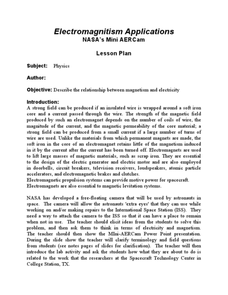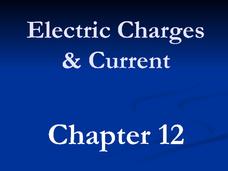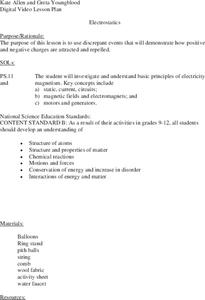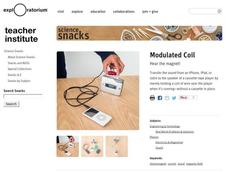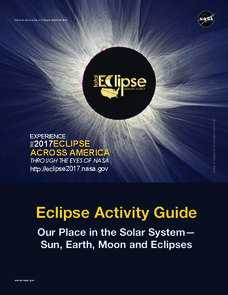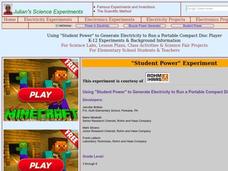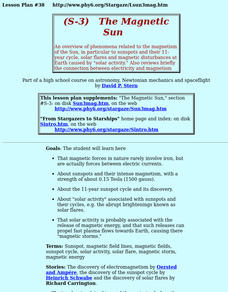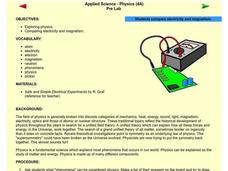Rice University
College Physics for AP® Courses
Take a look at an organized physics course. The 34-section electronic textbook covers material in AP® Physics 1 and 2. Teachers use the text to supplement lectures and have the class work through the labs. Each section contains...
PBS
NOVA Sun Lab Lesson Plan
Looking for a sun-sational multi-lesson plan full of videos, simulations, and discussion? Introduce your young scientists to all things solar with a four-part hands-on adventure. Pupils learn the basics of solar anatomy, space weather,...
Curated OER
Electromagnitism Applications
Students experiment on magnets and electricity. For this physics lesson, students determine what factors affect the strength of a magnetic field. They design an experiment to determine how electromagnetic field strength varies with...
Curated OER
Lenz's Law
Learners conduct a series of experiments on electromagnetic induction. For this physics lesson, students apply the right hand rule to determine the current direction and electromotive force. They test Lenz's and Faraday's law by...
Curated OER
Where in the World? The Basics of Latitude and Longitude
Students are introduced to the concepts of latitude and longitude. In groups, they identify the Earth's magnetic field and the disadvantages of using compasses for navigation. They identify the major lines of latitude and longitude on a...
Curated OER
Riding the Radio Waves
Students examine the basic concepts of radio waves and magnetic fields. They study how the AM radios are built and demonstrate the concepts of amplitude and frequency.
Curated OER
Making A Compass
This interesting science lesson is about the compass. Students make a compass out of a magnet, sewing needle, cork, and a glass dish. The lesson includes both a pre and post-test for the students to take, and some very good links to...
Mr. E. Science
Electric Charges and Current
Resistance is not futile, it is voltage divided by current. The presentation goes in depth covering electric charges, conductors, insulators, electric fields, static charges, and circuits. The lesson is the 12th in a series of 26.
Curated OER
Electrostatics
Pupils examine ways positive and negative charges are attracted and repelled by watching teacher demonstrations, and complete activity sheet related to classroom demonstration activities to prove proficiency of knowledge of Electrostatics.
Exploratorium
Diamagnetism
If you are attracted to activities dealing with diamagnetism, here is a rare find that you will appreciate. With a neodymium magnet and a few common materials, move a pair of juicy grapes without touching them. Though the fruit is...
Exploratorium
Modulated Coil
Transmit sound with an electromagnet. Class members follow the provided direction and build an electromagnet that will transmit sound though a cassette-tape player. As as extension they create an air core electromagnet and...
NASA
Eclipse Activity Guide
Ever made solar s'mores? Or recreated the solar system using peanuts? Astronomers young and old investigate all things solar using a variety of activities. Explore how the sun works, types of light it emits, and methods of charting the...
Curated OER
What is An Electromagnet?
Young scholars explore and define electromagnets. In this electromagnet lesson, students access an assigned web site to research what an electromagnet is and how it works. They complete a database with information from the web site and...
Curated OER
Using "Student Power" to Generate Electricity to Run a Portable Compact Disc Player
Students explain the relationship between magnetism and electricity. In this physics lesson, students describe the transformation of energy. They create an electromagnet and investigate the factors affecting its strength.
Curated OER
Electricity and Magnetism
Fourth graders compare electricity and magnetism. In this science lesson, 4th graders discuss the concepts of electricity and magnetism and brainstorm examples of electrical and magnetic forces.
Curated OER
What is a Magnet?
In this magnet activity, students review what makes up matter, how electromagnets are made, and how compasses work. This activity has 6 fill in the blank and 2 short answer questions.
WindWise Education
How Does a Generator Work?
I get a charge out of this. In order to learn how a generator works, groups build and test one in this ninth instructional activity of the series. The generators are tested at low speed and high speed to determine the watt output and...
Bonneville
Solar Pathfinder Tutorial
Find the right path to learn about solar energy. Scholars set up and use Solar Pathfinders to take measurements related to solar insolation at a particular site. Based on the data, they estimate the solar potential in kWh/m^2/day of a...
College Board
2018 AP® Physics 2: Algebra-Based Free-Response Questions
While the AP Physics 2 test maintains the reputation for one of the most difficult AP exams, scholars feel better prepared after practicing free-response questions on currents, conservation of energy, and displacement. The College Board...
McGraw Hill
Neutron Stars Interactive
The universe is full of sources of energy. Explore the energy of pulsars with your classes through a simulation. An interactive lesson allows learners to manipulate the angle of rotation of both the earth and the pulsars. A real-time...
K20 LEARN
This Is How the World Ends: Coronal Mass Ejections/Space Storms
Is this the end of the world as we know it? Pupils prepare for a coronal mass ejection during a lesson from the K20 Center. The activity combines video and Internet research in a collaborative assignment that focuses on public safety...
Curated OER
Electric Power Transmission and Distribution
Students explain how power is transmitted over long distances. In this physics instructional activity, students simulate controlling power flow in parallel transmission lines. They discuss several applications of wireless power...
Curated OER
Parametric Functions and Substitutions
In this solar winds activity, students determine the strength of magnetic storms in terms of the size of the change they make in the Earth's magnetic field. This worksheet has 3 problems to solve.




